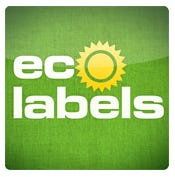New Eco-Label mobile app decodes green product labels, claims
January 30, 2014

Consumer Reports Eco-Label app
When you're in the store, how do you know which green product labels are truly meaningful and which aren't? Consumer Reports' new Eco-Label App, available in the iTunes App Store, brings consumers the information they need on a range of environmental product claims.
The Eco-Label App is a new mobile version of Consumer Reports' Greenerchoices.org, which includes an invaluable independent review of labels terms like"hypoallergenic" (not meaningful), "natural" (not meaningful) or "organic" (meaningful on most products, but not all).
"We've launched the mobile Eco-Label App to help consumers find out whether the claims on their favorite products are truthful," says Dr. Urvashi Rangan, director of consumer safety and sustainability at Consumer Reports. "As the popularity of green products continues to grow, it's important to know which green marketing claims you can trust and which ones you can't."
The Eco-Label App lets you search for information by alphabetical label index or by product including foods, cleaners and personal care products. It also offers a label "report card," which provides clear guidance on which labels make truthful and meaningful claims, and which do not.
Like all Consumer Reports' reviews, the information is based on expert, independent analysis from a trusted source. The App costs $0.99 and is located under the Utilities category in the App Store.
Know your eco-labels
•The best labels are meaningful, verified, consistent, transparent and independent. They are those that have been developed with broad public and industry input.
•General claims are those made voluntarily by the company and certified claims are generally those that have been approved by another certification group.
•While the term"organic" is highly meaningful on most foods, some products that claim to be such, like fish or fertilizers, do not have to meet the standards of the National Organic Program.
•Sustainable labels should address environmental, social and/or health concerns regarding products and production practices. Labels vary in breadth and depth of coverage, even specific labels like "no growth promoters," can add value to the conventional baseline.
The new Eco-Label App by Consumer Reports offers a clear, mobile guide to answer consumers' questions about the changing green marketplace. For more information, visit Greenerchoices.org.
Source: Consumer Reports
.
About the Author(s)
You May Also Like


